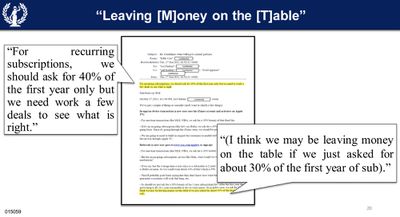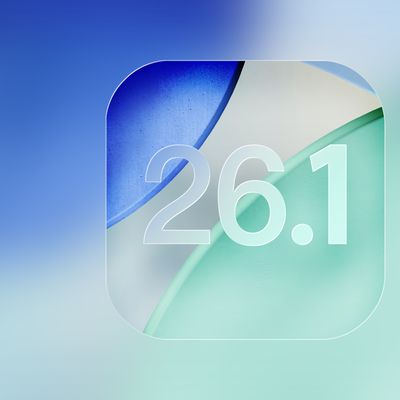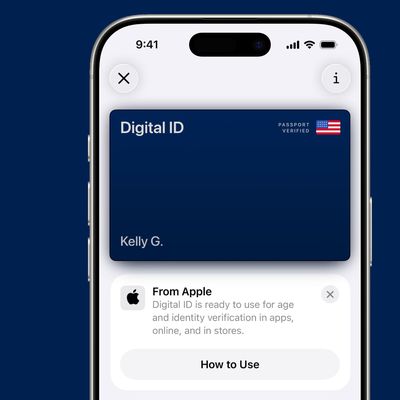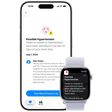Apple in 2011 Considered Collecting a 40% Fee From Some Subscription Apps
Apple once considered taking a 40 percent cut from some subscription apps, according to documents shared today by the House Judiciary Committee (via Bloomberg).

Back in March 2011, Apple's services boss Eddy Cue emailed three other executives and suggested Apple should "ask for 40% for the first year only," but that a "few deals" needed to be worked out for Apple to "see what is right."
One of the executives, Jai Chulani, wrote back that Apple could be "leaving money on the table" asking for 30 percent in the first year of subscriptions.
At the time, the emails referred to apps that offered digital content like Hulu on the Apple TV rather than apps running on iPhone and iPad, though Apple had launched App Store subscriptions in February 2011.
Apple ultimately decided to take a 30 percent cut from subscriptions purchased through the App Store, and later reduced that rate for longer running subscriptions. Today, when customers sign up for a subscription within an app, Apple collects 30 percent for the first year, and 15 percent for the second year and all subsequent years.
Apple CEO Tim Cook during his testimony at today's antitrust subcommittee meeting emphasized that Apple has not changed its App Store fees since the App Store launched, and has in fact lowered them, referencing the 15 percent cut.
Ahead of the antitrust meeting, Apple also commissioned a study suggesting Apple's App Store fees are in line with the fees collected by other digital marketplaces and service providers.
Popular Stories
Wednesday September 24, 2025 3:58 pm PDT by
Juli CloverWith the iPhone 15 series, I did an experiment and kept my iPhone's Charge Limit set at 80 percent for an entire year. It provided an interesting look at the impact of charge limits on battery longevity, so I decided to repeat it for the iPhone 16 line.
Since September 2024, my iPhone 16 Pro Max has been limited to an 80 percent charge, with no cheating. As of today, my battery's maximum...
Apple released the first beta of iOS 26.1 today, just a week after launching iOS 26. iOS 26.1 mainly adds new languages to Apple Intelligence, but there are a few other features that are worth knowing about.
New Apple Intelligence Languages
Apple Intelligence is now available in Danish, Dutch, Norwegian, Portuguese (Portugal), Swedish, Turkish, Chinese (Traditional), and Vietnamese.
AirPo...
While the iPhone 18 Pro and iPhone 18 Pro Max are still a year away, there are already a few rumors about the devices that offer an early look ahead.
Below, we have recapped some of the early iPhone 18 Pro rumors so far. This story was published previously, and it has been updated to reflect the latest rumors.
Many early rumors prove to be true, but nothing is confirmed yet, and Apple's...
The next Apple TV is expected to be released later this year, and a handful of new features and changes have been rumored for the device.
Below, we recap what to expect from the next Apple TV, according to rumors.
Likely Features
N1 Chip With Wi-Fi 7
Last year, Bloomberg's Mark Gurman said the next Apple TV would be equipped with Apple's own combined Wi-Fi and Bluetooth chip, which is...
The website ChargerLAB has tested the iPhone 17 Pro Max's USB-C charging speeds with a variety of Apple's chargers, from 18W to 140W.
The device reached a peak charging speed of around 36W with the following Apple chargers:40W Dynamic Power Adapter with 60W Max
61W USB-C Power Adapter
67W USB-C Power Adapter
70W USB-C Power Adapter
96W USB-C Power Adapter
140W USB-C Power AdapterFor...
Wednesday September 24, 2025 10:22 am PDT by
Juli CloverThe marks on the iPhone 17 Pro models that people have noticed at Apple retail stores are caused by the chargers that Apple uses, Apple confirmed today.
Apple told 9to5Mac that worn MagSafe charging stands in stores are causing marks on the iPhone 17 Pro and iPhone 17 Pro Max. Apple says that the marks are not scratches, and are instead material transfer from the stand to the phone. The...
Apple's annual "Back to School" promotion for students ends soon, so act fast if you want to score free AirPods with the purchase of an eligible new Mac or iPad.
Until Tuesday, September 30, college students and qualifying educational staff in the U.S. can receive free AirPods 4 with Active Noise Cancellation when they purchase an eligible new Mac or iPad from Apple. This is a $179 value.
...
Digital ID, the iOS 26 feature that lets U.S. passport holders add their passports to the Wallet app, is coming later in 2025, Apple confirmed today.
Apple updated the release timing wording of Digital ID on its iOS 26 features page. "Digital ID will be coming later this year with US passports only," it reads.
Prior to today, the footnote for the feature said "Digital ID will be available ...
With iOS 26.1, Apple Intelligence is gaining support for additional languages, including Danish, Dutch, Norwegian, Portuguese (Portugal), Swedish, Turkish, Chinese (Traditional), and Vietnamese.
Apple announced plans to expand the languages that can be used with Apple Intelligence last year, and now the added language support is here. Apple Intelligence is now available in the following...
Early reports have suggested that the iPhone 17 Pro and iPhone Air are more vulnerable to scratches and scuffs, primarily due to damage spotted at Apple Stores.
Apple customers have discovered that the iPhone Air and iPhone 17 Pro models Apple has out for display at its retail locations have scratching in the area of the MagSafe charger. Those devices are handled by hundreds to thousands of...


























